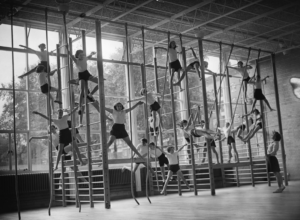
STS.014 Embodied Education: Past, Present, Future
Fall 2022: Tues/Thurs 11am-12:30pm
Prereq: None
3-0-9 units
Instructor: Professor Jennifer Light
Enrollment limited to 25
About the class:
A growing body of scientific and educational research makes clear that people think with their bodies – not just their brains – and that finding ways to move during the school day can enhance student learning. This class builds on MIT’s longstanding tradition of experiential education to explore the possibilities of an alternative future for K-12 education in which movement and academic subjects are combined.
We begin by looking backwards into history to understand why and how physical education was integrated into the educational system while remaining separate from academic subjects – before looking forwards to imagine why and how 21st-century institutions might want to combine the two. Weekly in-lecture “lab exercises” – which are in fact exercise – offer opportunities to viscerally understand the possibilities of embodied education, and invite students to create future curricula.
Students who enroll in this class may receive both HASS-S credit and two Physical Education and Wellness (PE&W) points. In addition, this class can also count towards a HASS concentration in Education or STS.
As a gateway STS class, no prior coursework is required. As an introductory offering in PE, no prior experience is needed—in fact, the class offers a taste of DAPER’s vast offerings. The only prerequisite is to come with an open mind and participate at your own level.
Examples of course labs include:
Yoga and Geometry: Math lessons that stretch both body and mind
Hip Hop and Black Culture: Learning history by dancing it
Judo and Physics: Martial arts as applied physics
Tai Chi and Traditional Chinese Medicine: Exercise is medicine–ancient roots of a modern idea
About your instructor:
This class grows out of my long-standing passion for physical activity, longtime curiosity about the mental benefits of exercise, and a year in circus school exploring ways to connect movement and academic learning. A variety of guest instructors, including DAPER faculty and outside guests, will join me to lead our labs.